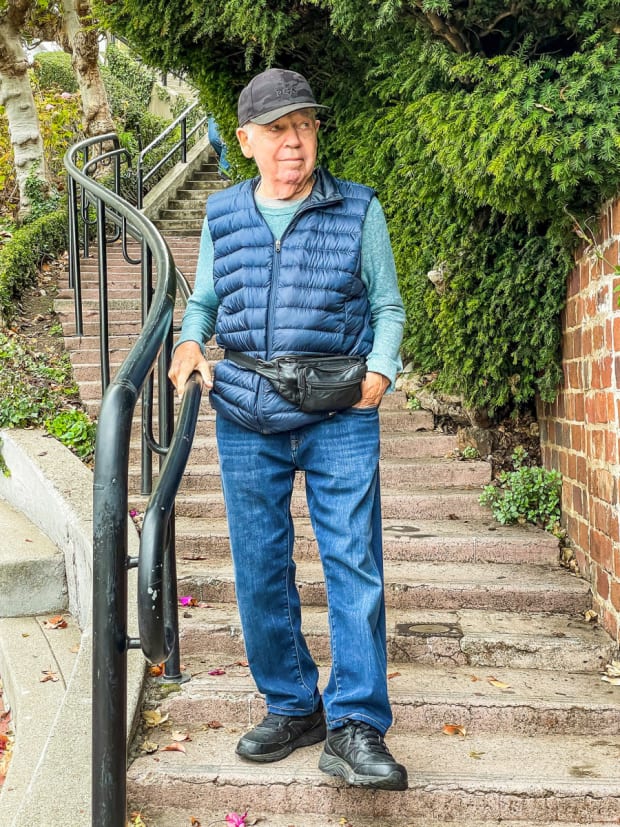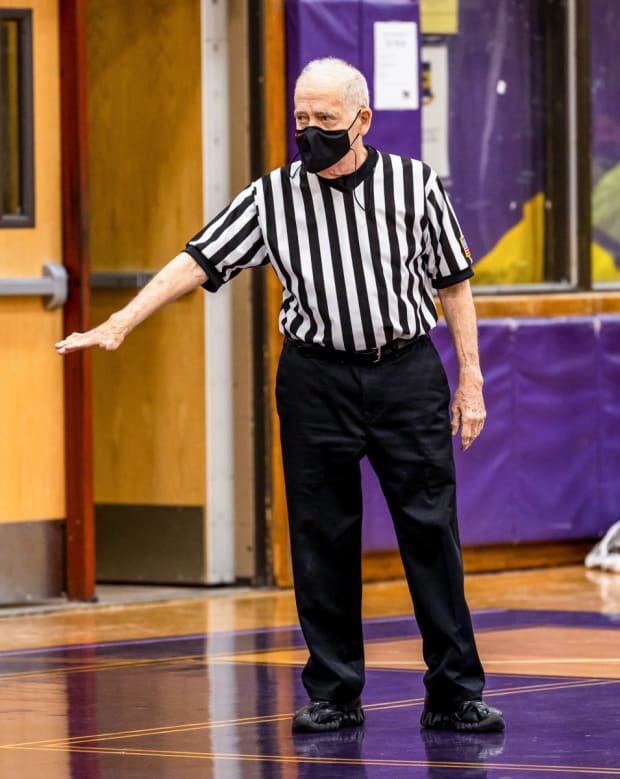
Photo by Julie Bretz/Courtesy of Steven Donnelly
He is gone now, but allow me to introduce you to Joe Donnelly. It is worth your time.
You may be too young, and he was too humble for that name to be familiar, but if you love baseball, appreciate the fading craft of writing and admire an honest life without pretense, you need to know Joe.
Joe Donnelly died Sunday at age 87. Born in Brooklyn, he charged through life as an indefatigable force of will, be it 37 years of writing about everyone from Sandy Koufax to Pedro Martinez, 37 years refereeing boys and girls junior varsity and junior high basketball, 33 years as a softball umpire, 20 years as an official scorer for the Mets, Yankees and Long Island Ducks, and the many years into his 70s as a caddie carrying a bag on each shoulder through hot Long Island summers.
More than his physical and mental strength, Joe stood out to me for his compassion. We were colleagues at Newsday. I was barely out of college and Joe was an established authoritative voice on baseball when I served as a backup beat writer to him for three years—until suddenly one day, just as Yankees spring training was about to begin in 1985, I replaced him, and he became my backup. Nobody was in my corner more than Joe. I am indebted to him for his kindness and friendship all these years.
We make no contributions greater than providing opportunity and encouragement for young people. That was Joe, whether it was unselfishly mentoring his replacement or pounding the hardwood on aching feet so junior high kids might someday gain from the effort, triumph, heartache and teamwork that sports offer.
Don’t be mistaken. Joe was no softie. Some would say irascible. He was the product of the hardscrabble writing life of those times. Newspaper writing was fueled by cigarettes and booze, the pounding of typewriter keys and, like giant waves to the shore, the constant ebb and flow of the clubhouse, where players and managers variously confided in and complained about the writers.
Joe wrote from 1958, when he started at the New York World-Telegram and The Sun, through ’95. He wrote through the smoke-filled heyday of newspapers, after Dick Young ventured into clubhouses in ’46 to use quotes in his stories up to the era when television and the internet made word pictures seem superfluous to a new generation.
The acronym TL;DR is a bald-faced admission of sloth. In Joe’s day, people relied on his prose to be delivered to their doorstep because they craved information and craft. Not all games were televised. Betting information was quarantined among illegal bookies. Players respected the power of the writing press.
As a craftsman, Joe was fortunate to land with Newsday in 1962, when sports editors Jack Mann and then Ed Comerford were turning an 18-person department into the most literate sports staff in the country. Donnelly was part of an inspired hiring blitz that Newsweek once called “The Kiddie Corps,” which included Stan Isaacs, Steve Jacobson, George Vecsey and Bob Sales—young writers who were storytellers riding the wave of “new journalism.”
“You’ve got 800 [words], sidebar if you need it,” Comerford would tell Donnelly on assignment. “Make me laugh, make me cry, put a tear in my eye.”
Every edition of Newsday read like an essay contest to see who could turn in the best prose.
Into this space, Donnelly brought the eyes and heart of a baseball scout. He loved the game as much as he did writing. He honored scouts, managers, coaches and umpires. He loathed boors, egotists and the entitled.
In 1980, Newsday sent him on a two-week trip to scout and write about Yankees and Mets prospects. It was one of his favorite assignments.
There was no hype in his game. He did not sell himself, his work or his subjects. True to his work as a referee and umpire, he called it as he saw it. One night, after Game 1 of the 1983 World Series in Baltimore, Joe was dining at the Prime Rib with fellow scribes when he was openly critical of the rendition of “The Star-Spangled Banner,” sung that night by John Denver. Seated at the next table within earshot: John Denver.

Photo by Julie Bretz/Courtesy of Steven Donnelly
If the cost of truth is rubbing some people the wrong way, Joe paid it without apology. Never flowery, his words crackled with intensity and richness of detail. He worked both clubhouses in covering a game. He told stories. He illuminated the people who play the game more than the results they produced.
“Make me laugh, make me cry” seems so quaint now among what is left of a reading audience that has no time to be so moved by words. So let me choose a few samples from the Donnelly oeuvre—my way of introducing you to Joe.
Here is Joe on the pain and will of Koufax, after the lefty beat the Mets, 4–2, at Shea Stadium in July 1966, his final season. With his elbow throbbing, Koufax threw 158 pitches in a complete game with 11 strikeouts.
The [team] bus would have to wait some more. They were encasing the lefthander’s arm in rubber tubing prior to immersing it in a sink packed with ice. Cleopatra seldom drew more attendants. The half-hour treatment is to keep the swelling down in Koufax’s arthritic left elbow.
Most of the Dodgers didn’t mind waiting. They’d never go anywhere without Koufax, who is now 16–4.
A year later, in 1967, this is Joe writing after a game-tying, 450-foot ninth-inning home run by Mickey Mantle off Jim Kaat for a bad Yankees team:
The one factor keeping the Yankees from being an abysmal, dull ballclub struck again last night. Mickey Mantle is the legend who won’t quit. Sometimes, it’s easy to understand why.
Donnelly noted only 19 balls ever were hit into the left-field bleachers, the expanse beyond Death Valley. Mantle had hit four of them. Joe DiMaggio did it only twice. You could practically smell the Aqua Velva in the Yankee postgame when Joe took you in there:
On and on it goes, and all Mantle wants to do is get out of the last-place locker room. He pulled a white turtleneck shirt over the 7-shaped scar on his right shoulder, talking as he dressed.
On Mets manager Gil Hodges, before the 1969 World Series:
When I was a teenager in Brooklyn, Gil Hodges used to come into our neighborhood candy store. I recall a time when he had reason to reprimand Gil Jr., 2 or 3 at the time. I remember being glad that Hodges’ huge hand was gentle on the youngster’s rump. The years have gone by, and the last two I’ve seen his knuckles go white on his desk top with some of my questions and those of other reporters. He is a big man who almost never loses his temper, and you have to like that. I do anyway.
On George Steinbrenner in February 1974, 13 months after he purchased the Yankees and vowed “absentee ownership” while letting Mike Burke and Lee MacPhail run the team:
Burke was gone from the Yankee scene in May after he found how difficult it was for him to run things. There were added indications that Steinbrenner was a strong-willed owner who would continue to try and shape the Yankees in the image he wanted.
John Callison, a major league veteran of 15 seasons, made a rare outfield appearance one night and misplayed a ball. The next day Steinbrenner told Ralph Houk and general manager Lee MacPhail, “I will not have that man on my team.”
Callison was gone by lunch, Houk by Oct. 1 and MacPhail by Jan. 1. It’s Steinbrenner’s team now, in the front office and with the attrition of ball players, it will be his on the ball field, too. He’s an enthusiastic man with seemingly remarkable energy who seems unwilling to settle for anything less than the top.
The controversial no-call by umpire Larry Barnett involving possible interference by Ed Armbrister of the Reds in Game 3 of the 1975 World Series landed right in Joe’s wheelhouse: the intersection of umpiring, fair play and baseball’s transition from a pastime to a cold business.
Armbrister should have been declared out, the ball ruled dead and baserunner Cesar Geronimo returned to first base. Still, I think there was a bigger error than Barnett’s misjudgment. The whole selection process of umpires to work a World Series is wrong.
Joe noted that commissioner Bowie Kuhn did not address the topic the next day.
Hear no evil, see no evil, speak no evil along with count-the-money continue to be the ultimate guideline within baseball.
Here is Joe admiring a one-hitter by the Yankees’ Luis Tiant at Oakland in 1979:
Above all else he is a skilled professional athlete. Forget the lack of hair, the waistline beyond recall, and all the tired jokes about his being 38 going on 45. On an afternoon made for a picture postcard, Luis Tiant was out there doing what he does best and it was beautiful to watch.
“I’ve never seen anything like that except on TV,” said rookie Rickey Henderson.
After yet another Mets loss in 1980:
Loose threads. Broken shoelaces. Include the Mets among these and other images of disarray. They don’t send them out that way to play. They start out as neat as the other guys, but lately they have been a disheveled lot at the finish, and last night was more of the same; a 5–4 loss to the Giants was their sixth straight defeat.
Joe discovered Don Mattingly long before major league fans did. He noted how his “sloped shoulders” reminded him of Stan Musial. Joe on Mattingly in 1982:
His name is Don Mattingly and the facts listed on him in the Yankees media guide are brief. Since he will not turn 21 until next month and is the youngest player in the big-league training camp, the brevity is understandable ... He is not big but sufficiently strong at 5–11 and 180 pounds and hands quick enough to pull the pitch to rightfield. He has demonstrated the good hitter’s knack of being a tougher out with runners in scoring position ...
On the death of Mantle in 1995, one of his last pieces in a 33-year run for Newsday:
I remember a shared cab ride to the old ballpark in Minnesota. Metropolitan Stadium in Bloomington was a bandbox, and as we got out of the cab, Mantle looked up at it and said, “I don’t know if Harmon [Killebrew] knows how fortunate he is.”
Then I got that stare again and he said, “If you write that, I’ll never talk to you again.” I guess I can get away with it now. Think what you will about this flawed man, but one of the most important things to know is that he never wanted to hurt anybody, particularly another ballplayer.
He saved whatever little strength he had left at the end for teammates. The breach he had with Whitey Ford, over a business matter, had been healed and he gave his friend one more beautiful moment. He sat up for him when Ford visited him in the hospital during Mantle’s final days.
The great ballplayer, we’re told, has five consummate skills. He can hit, hit with power, run, throw and field. To these Mantle added a sixth, one that is man’s gift to himself at life’s most trying moment.
He knew how to die.
For 25 years, through all kinds of November weather, Joe and I played an annual round of golf after the World Series. I so looked forward to our little tradition, mostly to spend a few hours talking baseball with Joe. Last year we set a tentative date, though Joe apologized in advance for “still battling back from 13-month battle with cancer” as well as right shoulder replacement surgery.
“Threw out too many runners at home plate,” he texted. “It seems we must eventually pay for our gifts.”
A day or two later, I broke my wrist. No golf.
“Gonna miss you,” he wrote. “But I am looking forward to next year when I hope we can resume what has become a battle for the aged and infirm.”
This year, hope arrived as October dawned.
“Are you still game to play with a groundball hitter?” he asked. “I’m hanging in pretty good.”
We picked a date. At the end of the month, another text arrived.
“I hate to do this but currently I have to give up golf,” he wrote. “I can’t handle any incline because of breathing issues. I can still ref hoops because it’s a flat surface but mostly young kids. I’m trying to be grateful, but I do miss golf.
“I’m hoping the breathing issues subside as quickly as it came upon me, so we can play golf next year. Hell, it will only be the autumn of my years so I’ll hang on to that hope as long as I can.”

Photo by Julie Bretz/Courtesy of Steven Donnelly
Five weeks later, ever hopeful, Joe was gone. The indefatigable was stopped. He took his last breath surrounded by family. Rest in peace, friend. Yours was a life lived fully, right to the end. To borrow from your words about Mantle, you exhibited man’s gift to himself at life’s most trying moment.
He knew how to die.







